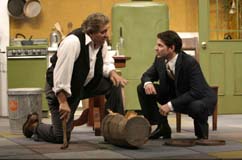
Paulanne Simmons
“A Stove Carver” Has Good Material but Doesn’t Cut Deep Enough
“A Stone Carver”
Directed by Robert Kalfin
Soho Playhouse
15 Vandam St., between 6th and Varick
Opened July 27, 2006
Tues. thru Fri. 8 p.m. Sat. 2 & 8 p.m., Sun. 3 p.m.
Closes Sept. 3, 2006
Reviewed by Paulanne Simmons July 25, 2006
 |
| Dan Lauria (left) and Jim Lorio (right) in "A Stone Carver." Photo by Cie Stroud. |
Agostino (Dan Lauria), the title character in William Mastrosimone’s new play, “A Stone Carver,” making its New York premiere at Soho Playhouse, has been living in the United States for most of his life, but his Sicilian past still prevails. So when the town he lives in issues eminent domain in order to build a new highway off-ramp through his property, he reacts the way any true Sicilian would. He loads his shotgun and refuses to move. And when his son, Raff (Jim Iorio), comes to Agostino’s run-down home (now his fortress) with his fiancée, Janice (Elizabeth Rossa), and tries to convince him to move, he treats them as if they are both his enemies.
Although Mastrosimone could easily have turned his play into a political statement, he is far more interested in the relationship, past and present, of father and son than in the plight of individuals who get in the way of the government. Thus the three-actor play revolves around the resentment Agostino and Raff harbor over their interpretations of past events: Agostino’s failures as a father (to be loving and understanding) and Raff’s failures as a son (to follow in his father’s footsteps and become a stone carver).
Directed by Robert Kalfin, “A Stone Carver” has many moments of poetic beauty. It also has many moments of monotonous repetition, clichéd or maudlin speech, and improbable action. This is a result of both Kalfin’s occasionally awkward staging, and Mastrosimone’s occasionally tin ear.
Another problem is Lauria (best known for playing Dad on “The Wonder Years”), who, despite some fine acting, hasn’t quite nailed the Italian accent and thus lets the character slip away from him.
Rossa, for the most part, is capable, if not exactly brilliant as Janice, but she sometimes succumbs to Mastrosimone’s hackneyed dialogue.
The most consistent acting is delivered by Iorio, who manages to survive everything except a ridiculous boxing scene one has the feeling was put in because it was the only way Mastrosimone could give the play some action and get a denouement out of a work in which nothing happens.
Here is the principal difficulty in this drama. After the first ten minutes the audience knows exactly who Agostino is and how he will react for the rest of the play: he’s Italian, he’s a bully, he’s macho, but at times he can be unexpectedly tender, especially when it comes to women.
“A Stone Carver” is a superficial treatment of a subject that continues to perplex humanity: how do we raise our children so that they can make us proud and also live their own lives? Mastrosimone had all the right elements (including a fabulous set by Nathan Hoverin), but he sometimes gets lost in the telling of his story (Agostino’s scenes with Janice are fun, but don’t do much to help resolve the central conflict) and he doesn’t go deep enough for a 90 minute play.
Seeing “A Stone Carver” is certainly not a waste of time, and is at times quite enjoyable, but it isn’t an experience you’ll never forget.
| lobby | search
| home | cue-to-cue |
discounts | welcome | film
| dance | reviews |
| museums | NYTW
mail | recordings | coupons |
publications | classified |
